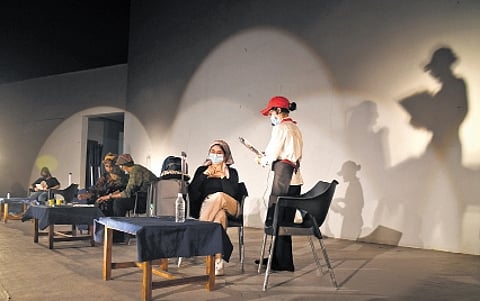Staging post-pandemic realities
HYDERABAD: Amidst the bustling ambiance of an airport, where emotions interweave amidst the echoes of masked conversations and the scent of sanitizers, unfolds the thought-provoking narrative of “Terminal 3”. This trilingual play, brought to the stage by The Department of Hispanic and Italian Studies at The English and Foreign Language University, Hyderabad, offers a compelling exploration of the post-pandemic world through relatable characters and scenarios.
The heart of the story beats around the accidental encounter of two old friends amidst the airport crowd, evoking a sense of immeasurable relief and nostalgia, particularly in the aftermath of traumatic events like the COVID-19 pandemic. As Ana Strejilevich and Madan Laal reconnect and reminisce about their past, present, and future, the audience is invited to discover the profound impact of the pandemic on individual lives and society as a whole. From piled-up dead bodies to shifts in economic status, the play showcases all the possible situations faced during the post-pandemic period.
Crafted with meticulous attention to detail by Dr Surendra Singh Negi, “Terminal 3” delves into the complexities of life in the wake of the pandemic. Discussing the inspiration behind the script, Dr Surendra Singh Negi, writer, and director of the play, expressed, “The idea for this play, Terminal 3, emerged from a meeting we had with the students of our department two months ago. The original idea was to work on a text written by somebody from Latin America. However, since the students were not comfortable with a full-length script, they asked if we could create our own performance. So the idea emerged from there. As we progressed, I started thinking about what we could work upon. I thought that the post-pandemic world is something that everybody can relate to, whether it’s a young person, students, faculty members, or common people. We have all lost somebody in our family, or a dear friend, or a colleague, or a student, or a professor. So it was a theme that everybody could relate to, and we started working on that, and things started emerging from there.”
Though primarily written in Hindi, English, and Spanish, the play captures universal themes of loss, resilience, and hope through the lens of diverse characters and linguistic backgrounds. Dr Surendra Singh Negi explained that they aimed to present a play from Latin America, which is Spanish-speaking. However, since this play was an original production from India, they could not write a play where the actors do not speak Indian languages. As a result, many characters speak Hindi and English, depending upon the socioeconomic class they come from, as well as Telugu or Malayalam, and other languages representing the rich diversity that India represents.
Dr Surendra said that the title ‘Terminal 3’ symbolically represents the post-pandemic scenario. “The title Terminal 3 is named because India has, I think, one airport, which has got three terminals. So it directly or indirectly mentions that the place situated in Delhi, and the play also starts from that terminal, which indirectly tells us that we are in the post-pandemic scenario. But when the play starts, you see that all the people are carrying masks. So it is one of those weeks when international travel had just started. And that is why you see everybody in masks and sanitizers also at the table.”
Addressing a scene in the play, he said he wanted to show the impact of the pandemic paired with social issues. “There’s a scene where you see two men are drinking alcohol on the streets. And then they indulge in a sexual assault scene, which includes a woman from outside India. So there again we see how these men, people from extremely marginalised sections, how the pandemic affected them so badly. So now, when the inequality is on the rise, it affects these people extremely badly. But when it hits them so hard, it directly or indirectly also affects the other sections of society, which are not necessarily from the same class. So it affects the extremely poor people living in the cities. But then the crime goes up, and when the crime goes up, it also affects people in the middle class or upper-middle-class also.
So inequality in society went up during the pandemic, and the crime also went up in general, and especially the crime against women also went up. So these are some of the issues that I wanted to highlight.” The upcoming shows will be held at Rangbhoomi by SnehaArts on March 31 and April 5 at Lamakaan.

